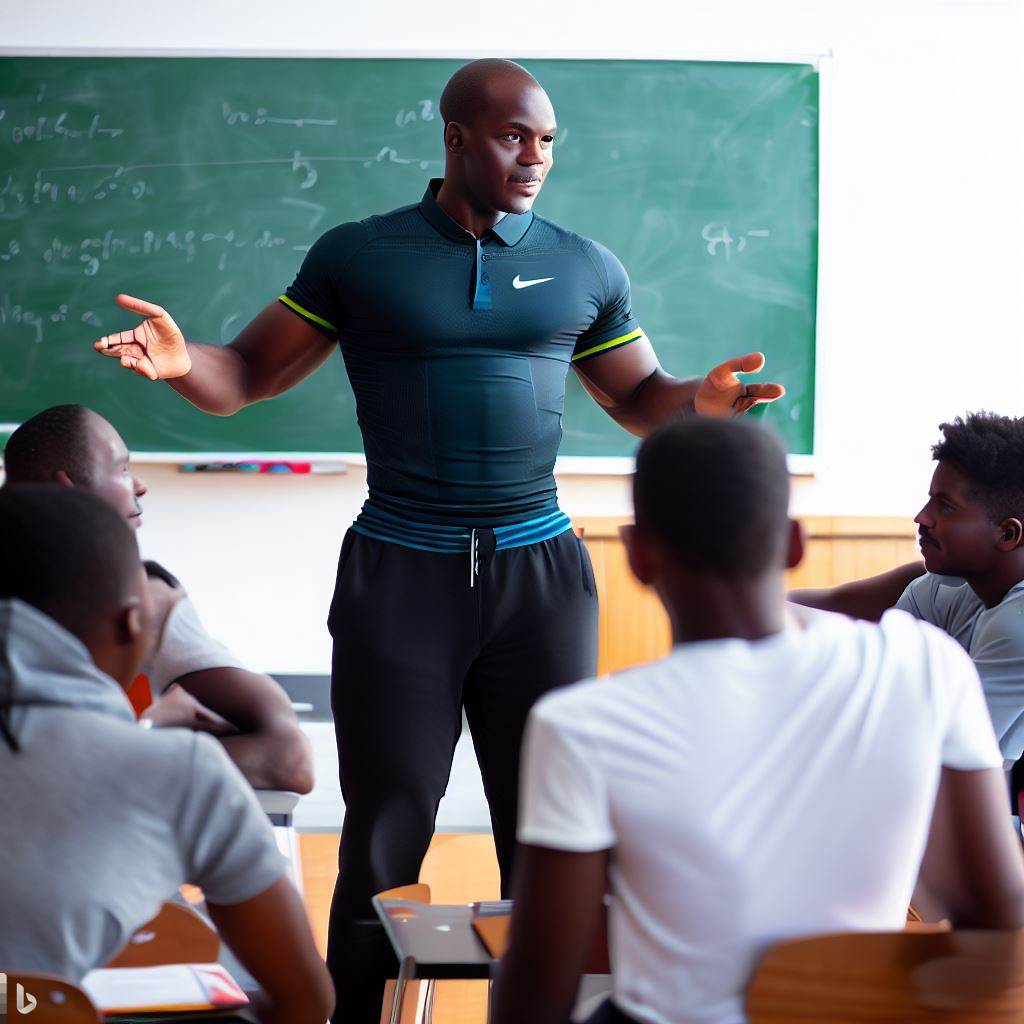Introduction
Athletic training, a vital healthcare profession, involves preventing and treating sports-related injuries.
In Nigeria, this field is gaining momentum due to the expanding sports industry.
Career growth in athletic training holds immense significance, offering:
- Injury Prevention: Athletic trainers play a pivotal role in reducing sports injuries, enhancing athlete performance.
- Rehabilitation: They aid in speedy recovery, minimizing downtime for athletes.
- Healthcare Integration: Athletic trainers bridge the gap between sports and healthcare, promoting holistic well-being.
- Sports Industry Boom: Nigeria’s growing sports industry demands qualified professionals for athlete care.
- National Pride: Athletic trainers contribute to Nigeria’s success on the global sports stage.
- Economic Opportunities: The field provides job prospects and financial stability.
- Health Awareness: Promoting fitness and injury prevention fosters a healthier nation.
Understanding the essence of career growth in athletic training is pivotal for Nigeria’s sports excellence and overall health.
Current State of Athletic Training in Nigeria
In Nigeria, the athletic training profession is gradually gaining recognition and importance.
The field primarily focuses on preventing and treating injuries in athletes, as well as optimizing their performance.
Overview of the athletic training profession in Nigeria
- Athletic trainers in Nigeria are responsible for assessing and managing injuries, providing emergency care, and developing rehabilitation programs for athletes.
- They work closely with sports teams, coaches, and medical professionals to ensure the overall well-being of athletes.
- The profession requires a strong background in sports medicine, anatomy, physiology, and clinical skills.
- Athletic trainers in Nigeria often work long hours and must be available during sports events and competitions.
- They play a crucial role in the sports ecosystem, contributing to the success of athletes and teams.
Challenges and limitations faced by athletic trainers in the country
- Despite the increasing demand for athletic trainers, there is a shortage of professionals in Nigeria.
- Limited access to quality education and training programs hinders the growth of the athletic training profession.
- Financial constraints also pose challenges for aspiring athletic trainers in pursuing higher education and specialized certifications.
- Athletic trainers in Nigeria often face inadequate support and recognition from sports organizations and government authorities.
- The lack of standardized protocols and guidelines adds to the difficulties faced by athletic trainers in providing consistent care.
- Infrastructural limitations, including insufficient medical facilities and equipment, further impact the effectiveness of athletic training services.
- There is a need for a synchronized effort from stakeholders to address these limitations and enhance the state of athletic training in Nigeria.
Overall, the athletic training profession in Nigeria is growing in importance, but it faces several challenges and limitations.
Addressing the shortage of professionals, improving access to education and training, and increasing support from sports organizations and government authorities are crucial for its advancement.
By overcoming these obstacles, Nigeria can further enhance the overall quality of sports medicine and athlete care in the country.
Read: Roles and Responsibilities of Athletic Trainers in Nigeria
Factors Affecting Career Growth in Athletic Training in Nigeria
In order to understand the challenges faced by athletic trainers in Nigeria, it is important to examine the factors that affect their career growth.
Several key factors contribute to the limitations faced by athletic trainers in Nigeria:
Lack of Recognition and Support for the Profession
- Athletic training is often overlooked and undervalued in Nigeria, leading to a lack of recognition for the profession.
- The general public and even some healthcare professionals may not fully understand the important role of athletic trainers
- The lack of support from government agencies and sports organizations further hinders the growth of athletic training in Nigeria.
Insufficient Educational Programs and Professional Development Opportunities
- There is a shortage of accredited educational programs in athletic training in Nigeria, limiting the number of qualified professionals.
- The existing programs often lack necessary resources and equipment to provide comprehensive training.
- Furthermore, the absence of continuing education and professional development opportunities prevents athletic trainers from enhancing their skills and knowledge.
Limited Job Opportunities and Job Security
- The number of job opportunities for athletic trainers in Nigeria is limited, making it difficult for professionals to find employment
- The scarcity of positions leads to intense competition among athletic trainers and a lack of job security.
- Moreover, the overall underfunding of sports programs in Nigeria results in a reduced demand for athletic trainers.
These factors together create significant hurdles in the career growth of athletic trainers in Nigeria, impacting their professional development and progression.
Addressing these challenges requires a collaborative effort from various stakeholders:
Government Support and Recognition
The Nigerian government should recognize the importance of athletic training as a healthcare profession and provide the necessary support.
Improved Education and Training Programs
Efforts should be made to establish more accredited educational programs in athletic training, equipped with modern facilities and resources.
Enhanced Professional Development Opportunities
Continuing education programs and workshops should be organized regularly to provide athletic trainers with opportunities to update their skills and knowledge.
Increased Job Opportunities and Job Security
More sports organizations and institutions should create positions for athletic trainers, and steps should be taken to ensure job security within the field.
By addressing these factors and implementing necessary changes, Nigeria can foster the growth of athletic training as a profession, paving the way for a brighter future for aspiring athletic trainers in the country.
Read: How to Get Certified as an Athletic Trainer in Nigeria
Opportunities for Career Growth in Athletic Training in Nigeria
When it comes to career growth in athletic training, Nigeria presents several promising opportunities.
With the increasing awareness and importance of sports and exercise in the country, coupled with potential international collaborations and exposure, athletic trainers can expect a bright future ahead.
Additionally, the upcoming sporting events and the need for skilled professionals further contribute to the potential for career advancement.
1. Increasing awareness and importance of sports and exercise in Nigeria
- The Nigerian population is becoming more conscious of the benefits of sports and exercise for overall health.
- As a result, there is a growing demand for athletic trainers who can help individuals optimize their performance levels.
- Opportunities arise in various sectors, including professional sports teams, fitness centers, and sports academies.
2. Potential for international collaborations and exposure
- Athletic trainers in Nigeria have the chance to collaborate with international sports organizations and professionals.
- This collaboration brings exposure to different training methods, techniques, and advancements in the field.
- Such exposure can enhance the skill set of athletic trainers, making them more competitive globally.
3. Upcoming sporting events and the need for skilled athletic trainers
- Nigeria is hosting several major sporting events in the near future, such as the All-Africa Games and FIFA World Cup qualifiers.
- With these events come opportunities for athletic trainers to work with elite athletes and national teams.
- The demand for skilled professionals in injury prevention, rehabilitation, and performance enhancement will be high.
- Organizations and sports clubs will seek qualified athletic trainers to ensure the well-being of their athletes.
In essence, the career growth prospects for athletic trainers in Nigeria are promising.
The country’s increasing awareness of sports and exercise, potential for international collaborations, and the upcoming sporting events all contribute to creating a favorable environment for career advancement.
As athletic training becomes more valued and recognized in Nigeria, professionals in the field can expect exciting opportunities and challenges ahead.
Read: Challenges in the Athletic Trainer Profession in Nigeria

Steps to Improve Career Growth in Athletic Training in Nigeria
Advocacy Efforts
- Begin by forming a national athletic trainers’ association.
- Advocate for official recognition and licensure of athletic trainers in Nigeria.
- Collaborate with government agencies and sports organizations to emphasize the importance of athletic training.
- Promote the role of athletic trainers through media campaigns and educational outreach.
Enhancing Educational Programs
- Establish accredited athletic training programs in universities and colleges.
- Develop a standardized curriculum that aligns with international best practices.
- Encourage partnerships with experienced trainers and institutions to enhance practical training.
- Promote continuous professional development through workshops and seminars.
Offering Specialized Courses
- Introduce specialized courses in areas like sports nutrition, injury prevention, and rehabilitation.
- Collaborate with healthcare institutions to provide access to advanced courses.
- Ensure that courses are up-to-date with the latest advancements in sports medicine.
- Offer certification programs to validate expertise in specialized fields.
Encouraging Research and Innovation
- Establish research grants for athletic trainers to conduct studies on sports-related topics.
- Encourage trainers to publish their findings in reputable journals.
- Foster innovation in injury assessment and treatment methods.
- Promote the use of technology in athlete monitoring and performance optimization.
Essentially, improving career growth in athletic training in Nigeria requires a multifaceted approach.
Advocacy efforts, enhanced education, specialized courses, and a strong focus on research and innovation will elevate the profession, ensuring that athletic trainers play a pivotal role in the country’s sports and healthcare systems.
By implementing these steps, Nigeria can cultivate a thriving athletic training community that contributes to the overall success of its athletes and sports industry.
Read: Top Athletic Training Schools in Nigeria: A Comprehensive List
You Might Also Like: Strength Coaching: A Women’s Perspective in Nigeria
Successful Athlete-Medical Professional Partnerships in Nigeria
In Nigeria, there have been numerous case studies and examples of successful collaboration between athletes and athletic trainers.
These partnerships have proven to be beneficial and have led to positive outcomes for both parties involved.
- Improved Performance: Athlete-medical professional partnerships have been shown to improve overall performance. Athletic trainers provide specialized training programs and injury prevention strategies tailored to the specific needs of the athletes, resulting in enhanced performance on and off the field.
- Injury Prevention: Collaboration between athletes and athletic trainers focuses on injury prevention. Trainers assess the athletes’ physical condition, identify potential risk factors, and develop personalized recovery plans to minimize the occurrence of injuries during training and competitions.
- Quick Rehabilitation: In the event of an injury, athletic trainers play a crucial role in the athlete’s rehabilitation process. By leveraging their knowledge and skills, trainers help athletes recover quickly, manage pain, and regain strength, enabling them to return to their sport sooner.
- Enhanced Technical Skills: Athletes working closely with athletic trainers benefit from their expertise in biomechanics and movement analysis. Trainers assess athletes’ techniques and provide guidance on improving skills to optimize performance and reduce the risk of injuries caused by incorrect form.
- Increased Safety: Safety is a top priority in athlete-medical professional partnerships. Trainers educate athletes on proper warm-up and cool-down techniques, as well as the correct use of protective gear to ensure their safety during training and competition.
- Improved Emotional Well-being: Apart from physical support, athletic trainers also provide emotional support to athletes. They act as a confidante and help athletes manage the psychological challenges that often come with the demands of competitive sports, leading to improved overall well-being.
Overall, athlete-medical professional partnerships in Nigeria have proven to be instrumental in facilitating career growth in athletic training.
As the benefits and positive outcomes of these collaborations become evident, it is expected that the field will continue to flourish, creating new opportunities for athletes and athletic trainers alike.
Conclusion
Career growth in athletic training is crucial for the development of sports in Nigeria.
As discussed in this article, there is a need for more certified athletic trainers to provide effective healthcare to athletes.
It is essential for aspiring athletic trainers and professionals in the field to pursue higher education, gain practical experience, and continuously update their skills to thrive in this competitive industry.
Despite the challenges, the field offers immense opportunities for growth and success.
By working together and creating a supportive community, we can contribute to the advancement of athletic training in Nigeria and ensure the well-being of our athletes.
Don’t be discouraged, but rather, be motivated to make a positive impact in the field of athletic training in Nigeria.
Your dedication and passion can help shape the future of sports in our country.
So, let’s strive for excellence, continuously learn, and embrace the countless possibilities that lie ahead in this exciting and rewarding career path.




